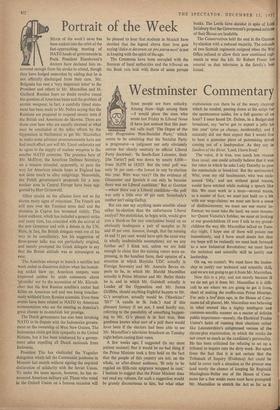Portrait of the Week
MUCH of the week's news has been sucked into the orbit of the fast-approaching meeting of NATO heads of governments in Paris. President Eisenhower's doctors have declared him re- covered enough from his stroke to attend, though they have hedged somewhat by adding that he is not officially discharged from their care. Mr. Bulganin has sent a 'very important letter' to the President and others to Mr. Macmillan and M. Gaillard. Russian fears no doubt revolve round the question of American bases and the problem of atomic weapons; in fact, a carefully timed state- ment has been made to Mr. Nehru saying that the Russians are prepared to suspend atomic tests if the British and Americans do likewise. There are those over here who are equally alarmed at what may be concluded at the talks; efforts by the Opposition in Parliament to get Mr. Macmillan to make some advance pronouncements have not had much effect, nor will Mr. Lloyd undertake not to agree to the supply of nuclear weapons to the smaller NATO countries. The presence here of Mr. McElroy, the American Defence Secretary, on a mission intended, apparently, to pave the way for American missile bases in England has not done much to allay misgivings. Meanwhile, the Polish government's proposals for a non- nuclear area in Central Europe have been sup- ported by Herr Grotewohl.
Other strains on the alliance have not so far shown many signs of relaxation. The French are still sore over the Tunisian arms deal and the situation in Cyprus has worsened visibly. This latest outburst, which has included a general strike and many riots, has coincided with the arrival of the new Governor and with a debate in the UN. Here, in fact, the British delegate went out of his way to be conciliatory, but his suggestion of three-power talks was not particularly original, and merely prompted the Greek delegate to say that the British attitude was as intransigent as ever.
The American attempt to launch a satellite last week ended in disastrous failure when the launch- ing rocket blew up; American tempers were improved neither by snide comments about `phutniks' nor by the accusation of Mr. Khrush- chev that the first Russian satellite's rocket had fallen on American soil and was being treacher- ously withheld from Russian scientists. Even these events have been related to NATO by American commentators who see the meeting as America's great chance to re-establish her prestige.
The Dutch government has also been invoking NATO in its dispute with the Indonesian govern- ment on the ownership of West New Guinea. The Indonesian claim got little sympathy in the United Nations, but it has been reinforced by a govern- ment edict expelling all Dutch nationals from Indonesia.
President Tito has vindicated the Yugoslav delegation which left the Communist jamboree in Moscow last month without signing the required declaration of solidarity with the Soviet Union. To make the score square, however, he has re- nounced American military aid. Those who voted in the Oxford Union on a famous occasion will be pleased to hear that students in Munich have decided that the legend above their iron gate saying `dulce et decorum est pro patria more is not in keeping with the spirit of the age.
The Commons have been occupied with the finances of local authorities and the tribunal on the Bank rate leak with those of some private banks. The Lords have decided in spite of Lord Salisbury that the Government's proposed reforms of their House are laudable.
The Conservatives held the seat in the Garston by-election with a reduced majority. The colonels of two Scottish regiments resigned when the War Office refused to allow their now combined regi- ments to wear the kilt. Sir Robert Fraser has assured us that television is the family's best friend.






































 Previous page
Previous page